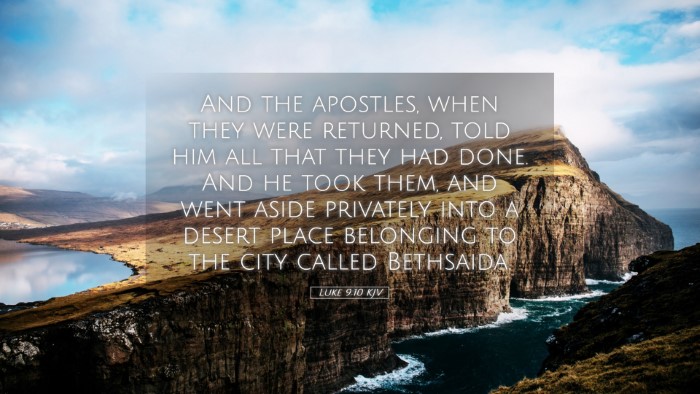Luke 9:10 Commentary
Verse: "And the apostles, when they were returned, told him all that they had done. And he took them, and went aside privately into a desert place belonging to the city called Bethsaida."
Introduction
In Luke 9:10, we find a critical moment in the ministry of Jesus, where the apostles return from their first commission. This verse is part of a narrative that highlights the transition of the apostles from learners to active participants in the ministry of Christ. It serves as a foundation for understanding the importance of reflection, rest, and the setting for ministry.
Contextual Background
Both Matthew Henry and Albert Barnes emphasize the significance of the apostles’ return and their report to Jesus. The context of Luke’s Gospel points to a time of both activity and fatigue as the disciples go from preaching, healing, and teaching to returning for accountability and reflection. Luke draws attention to the necessity of rest in ministry, which is vital for spiritual rejuvenation and deeper insight into their experiences.
Meaning of the Text
In this passage, the circumstances of the apostles returning are worthy of deep examination. According to Adam Clarke, the phrase "when they were returned" suggests not only a physical return but also a return to fellowship with Christ—a crucial element in discerning their experiences and understanding the next steps in ministry. The essence of reporting back highlights the importance of accountability and growth within a community of believers.
The Apostles' Report
- Reflection on Ministry: The apostles' report encapsulates their successes and struggles during their commissions. Matthew Henry notes that the act of sharing their experiences with Jesus creates an atmosphere of learning and growth.
- Incorporating Lessons Learned: Albert Barnes points out the importance of bringing their experiences back to the Teacher for interpretation and guidance. This not only indicates the respect the apostles had for Jesus but also models a principle for future leaders in ministry.
The Call to Solitude
After the apostles share their experiences, Jesus takes them to a "desert place." The term desert in this context is not merely a physical description but a strategic choice for a period of spiritual retreat. Jesus often withdrew to solitary places for prayer, setting a precedent for His disciples.
- The Importance of Rest: Matthew Henry emphasizes that both ministry and personal relationship with God require periodic retreats. Such times are essential for spiritual replenishment.
- Private Ministry: Adam Clarke remarks on the value of private and communal worship, suggesting that true understanding often emerges from solitude and reflection on shared experiences.
Bethsaida: Symbolic Significance
The location, Bethsaida, is significant as it was a place known for Jesus’ miracles and teachings. By leading the disciples there, Jesus not only provides a backdrop for teaching but also evokes memories of past miracles, reinforcing the connection between their experiences and the mission ahead.
- Sign of Assurance: Albert Barnes notes that returning to locations of past experiences can be a means of reassurance for believers. It reminds them of God's faithfulness and the power of His works.
- A Place of Preparation: The retreat to Bethsaida serves as a preparatory stage for the larger mission ahead, suggesting that leaders must be fortified in their faith before engaging in greater tasks.
Theological Implications
This passage raises several theological considerations that resonate with pastors, students, and theologians:
- Accountability in Ministry: The necessity for ministers to report and reflect upon their actions highlights the biblical principle of accountability among believers (James 5:16).
- Rest as a Sanctified Practice: Emphasizing the importance of retreat and rest, the passage calls believers to integrate periods of withdrawal into their ministry practice for spiritual and physical rejuvenation.
- Mission and Preparation: The need for discipleship preparation before jumping into greater ministry challenges underscores a transformative process of becoming more like Christ before representing Him to the world.
Practical Applications
For pastors and church leaders, Luke 9:10 serves as a reminder to:
- Prioritize moments of reflection and accountability within their ministry teams.
- Encourage periods of solitude for personal spiritual growth and connection with God.
- Seek continual guidance from the Lord through prayer and the study of scripture as they prepare for the work ahead.
Conclusion
Luke 9:10 invites a deep reflection on the rhythm of ministry, calling believers to balance their active work for the kingdom of God with critical moments of rest and revival. The insights from various public domain commentaries remind us that effective ministry emerges from thoughtful reflection, prayerful solitude, and a committed relationship with Christ. The apostles’ experience becomes not just a historical event but a template for all believers engaged in the mission of spreading the Gospel.


